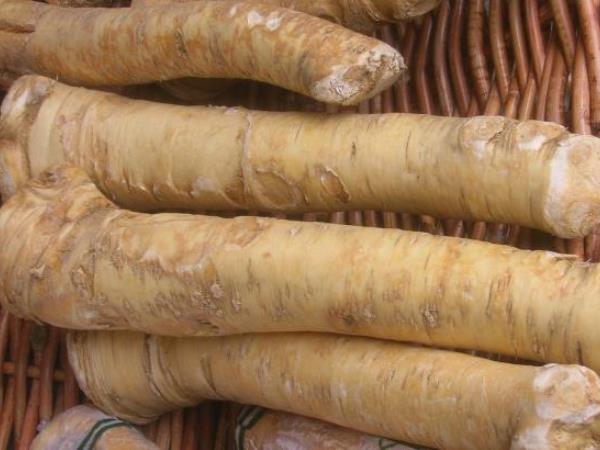And they would be right.
Horseradish: the medicine of the old world
Horseradish (Armoracia rusticana) was already known to the ancient Egyptians, who used it to increase physical strength and as medicine. In the Middle Ages, it was precious as a spice and medicine at the same time; today, research confirms that horseradish is a powerful natural antibiotic.
It contains substances with antibacterial (destroy bacteria), antiviral (inhibit viruses), and antifungal properties. Especially important are glucosinolates – compounds also found in broccoli, kale, and mustard, which break down in the body into isothiocyanates known for their strong antimicrobial effect.
In a study from 2007, published in Phytotherapy Research, it was found that horseradish extract is effective against more than 20 different types of bacteria - including some that cause sinusitis and bronchitis.
Why does horseradish work so well for the respiratory system?
When we suffer from stuffed sinuses, cough, or a sore throat, we often reach for synthetic medications. But horseradish offers a natural alternative, as it:
- clears the respiratory tract, dissolves mucus, and helps us cough more easily,
- has anti-inflammatory properties, reducing swelling and redness in the throat and sinuses,
- and most importantly - strengthens our immune system.
Horseradish contains 79 mg of vitamin C per 100 grams, which is more than an orange! (which contains around 53 mg/100 g). Vitamin C is crucial for the body's defense, as it stimulates white blood cells to fight infections more effectively.
Additionally, horseradish also contains potassium, calcium, magnesium, and fiber, which aid in digestion and detoxification of the body.
Horseradish against bronchitis and urinary tract infections
One interesting study from Germany (published in Arzneimittel-Forschung) showed that a combination of horseradish and nasturtium (another medicinal plant) helps in treating acute respiratory infections and even bladder inflammation, without the need for antibiotics. Patients with mild infections reported faster symptom improvement in the study without side effects.
This means that horseradish could become an important part of our home "medicine cabinet", especially in times when bacteria are becoming more resistant to antibiotics.
Recipes from home kitchens
And how do we use it? You don't have to be a pharmacist to prepare an effective horseradish remedy. Here are some proven ways to use it:
- Syrup for sinuses and throat
Grate fresh horseradish root into thin slices and place it on a gauze stretched over a bowl. Sprinkle it with powdered sugar (you can also use honey for a more natural version) and let it sit for a few hours or overnight. Consume the syrup, which will slowly drip into the container, one to two tablespoons a day before meals.
Why does it work? Sugar or honey pulls out the juice from the horseradish, containing all the beneficial compounds. The syrup acts as a natural antibiotic and effectively opens the sinuses. - Tea for lungs and throat
For those struggling with persistent cough, bronchitis, or hoarseness, we recommend tea. You need 10 grams of grated horseradish in 2 dcl of boiling water. Let it sit for 5 minutes, then strain. Drink one cup three times a day.
Why does it work? Heat helps release the volatile compounds from horseradish that soften mucus and alleviate cough. - Detox drink for the body
Grate horseradish root and soak it in milk. Drink one cup three times a day, for at least one month. Milk reduces the burning effect of horseradish and helps the body better absorb medicinal substances.
Why does it work? Horseradish stimulates the function of the liver and kidneys, helping the body quickly rid itself of toxins.
Some interesting figures
According to the European Food Safety Authority (EFSA), 100 g of horseradish also contains 246 mg of potassium, important for a healthy heart.
In traditional German medicine, horseradish has been used for more than 500 years as a remedy for colds and flu.
In the United States, the consumption of natural antibiotics like horseradish is increasing by about 6% annually, as people seek more natural ways of treatment.
In Poland, horseradish is one of the top 10 recommended plants for treating the flu, along with elderberry and garlic.
What do the researchers say?
Dr. Maria Pasi from the Institute of Natural Medicine in Berlin says: Horseradish is one of the most underestimated natural antibiotics. Its power lies in volatile oils that quickly penetrate the difficult areas - sinuses, throat, bronchi.
Slovenian ethnobotanist Jasna Kogoj agrees, saying: Every garden should have at least one horseradish root - for protection against viruses and as first aid for infections.
Warning
Although horseradish is natural, it's not suitable for everyone. People with sensitive stomach mucosa or stomach ulcers should consume it carefully and in small quantities. It's not recommended for children under the age of three.









 Would you like to be informed about news on the website?
Would you like to be informed about news on the website?

